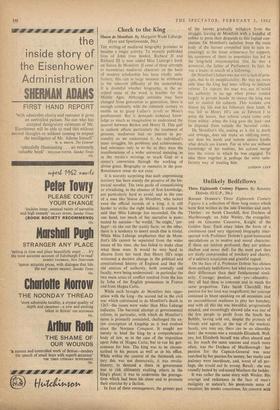Check to the King
Simon de Montfort. By Margaret Wade Labarge. (Eyre and Spottiswoode, 30s.)
THE writing of mediaeval biography promises to become a major activity. To recently published lives of John (two books), Richard 11 and Richard III is now added Miss l.abarge's book on Simon de Montfort. If none of these attempts to reconstruct medieval character on the basis of modern scholarship has been wholly satis- factory, this can in large measure be attributed to the inherent difficulty of the undertaking. It is doubtful whether biography, in the ac- cepted sense of the word, is feasible for the Middle Ages. Although attitudes may have changed from generation to generation, there is enough continuity with the sixteenth century to enable us to grasp Luther's revolt or More's predicament. But it demands technical know- ledge as much as imagination to understand the quarrel between Becket and Henry ii. This gulf in outlook affects particularly the treatment of persons; inedimvals had no interest in per- sonality as we understand it. An individual's inner struggles, his problems and achievements, had relevance only in so far as they were the manifestations of a wider universal meaning, as in the mystic's strivings to reach God or a sinner's conversion through the working of divine grace. Biography or memoirs in the post- Renaissance sense do not exist.
It is scarcely surprising that such unpromising territory has been mainly the preserve of the his- torical novelist. The twin perils of romanticising or trivialising, in the absence of firm knowledge, are particularly hard to avoid; and in the case of a man like Simon de Montfort, who lacked even the official records of a king, it is still harder to strike the right balance. It cannot be said that Miss Labarge has succeeded. On the one hand, too much of her narrative is punch tuated by surmise—`he would,' he might,' per- haps'—to eke out the scanty facts; on the other, there is a tendency to insert much that is trivial. While Miss Labarge emphasises that de Mont- fort's life cannot be separated from the wider issues of his time, she has failed to make clear what these were. It would be very hard to discern from her book that Henry III's reign witnessed a decisive change in the political and constitutional history of England and that the old sources of authority, both centrally and locally, were being undermined: in particular the two main areas of conflict resulted from the loss by John of the English possessions in France and from Magna Carta.
While each brought de Montfort into oppo- sition with the king—the second led to the civil war which culminated in de Montfort's death in 1265—the issues were wider than Miss Labarge indicates. The baronial attempt at governmental reform, in particular, with which de Montfort's name is primarily associated, challenged the en- tire conception of kingship as it had evolved since the Norman Conquest. It sought not merely to bind the king by a comprehensive body of law, as in the case of the imposition upon John of Magna Carta; but to run his gov- ernment for him. The king was to be circum- scribed in his person as well as in his office. While within the context of the thirteenth cen- tury this was not democratic, it was revolu- tionary; to demand a share in government was to risk ultimately exalting others in the king's place; it was to undermine the preroga- tives which had been his alone and to promote their exercise by a faction.
In face of these consequences, the greater part of the barons, gradually withdrew from the struggle, leaving de Montfoit with a handful of nobles to press their demands to this logical con- clusion.' De Montfort's isolation from the main body of the barons compelled him to turn in- creasingly to the lesser aristocracy for support; his summons of them to assemblies has led to the long-held misconception that he was a democrat, the father of Parliament. In fact, he was a leader in search of a following.
De Montfort's failure was due not to lack of prin- ciple, but to its inapplicability. He was no more able than the .king had been willing to institute reform. To capture the man was not to wield his authority in an age when power resided largely in private hands; to coerce the king was not to control his subjects. This mistake cost Simon his life and his followers their lands. It was left to Henry Ill's son as Edward 1 to point the lesson, that reform could come only from within--when the king gave the lead—not be imposed from outside the baronial ranks.
De Montfort's life, ending as it did in death and revenge,, does not make an edifying story; nor does his harsh and remote nature kindle what details are known. For us who are without knowledge of his motives, his actions merge into the events in which he was engaged. To take them together is perhaps the most satis- factory way of treating him.
GORDON LEFF


































 Previous page
Previous page